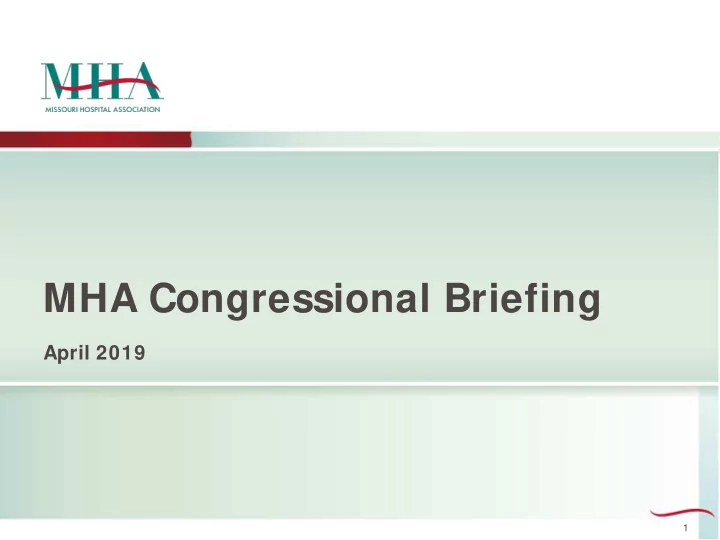

MHA Congressional Briefing April 2019 1
Medicaid DSH Allotment Reduction Current federal law reduces states’ Medicaid DSH allotments effective October 1, 2019. Allotment cuts authorized by the ACA ― slated to begin in 2014; postponed four times Little CMS guidance on details MHA did hospital-specific projections; aggregate loss of $146 million Advocacy message: Delay the DSH Reductions 2
3
State and District DSH Reductions $146 million reduction beginning October 2019 Estimated to increase to more than $300 million beginning October 2020 4
Potential Changes to Medicaid DSH Allotment Distribution Congressional interest in revamping the formula for distributing Medicaid DSH among the states Some states assert they are disadvantaged. Missouri has a robust DSH allotment to defend. MACPAC: Allotments should reflect each state’s number of low-income, nonelderly residents. 5
CMS and “I mmediate Jeopardy” Citations CMS has issued its new Appendix Q to streamline and improve “immediate jeopardy” standards. Sen. Blunt has been instrumental in drawing attention to this issue with CMS and DHSS officials. MHA is monitoring the effects of the new CMS standards. 6
“Surprise Billing” Bipartisan congressional interest in “surprise billing” ― billing and payment standards for out-of-network practitioners Some pending federal proposals are unworkable, i.e., hospitals must tell patients each practitioner’s network participation status. A 2018 state law addresses many surprise billing concerns without imposing new hospital duties. MHA focus is on staving off federal bills that supersede or undermine the state law. 7
“Surprise Billing” National hospital groups have developed a set of advocacy principles, which include: A handout summarizes the Missouri surprise billing law. 8
Hospital Price Transparency – Federal Actions 2010 – The Affordable Care Act directs hospitals to disclose a list of the hospital’s standard charges, including for diagnosis- related groups. A 2015 IPPS final rule requires hospitals to either make public a list of or their policies for obtaining their standard charges. 2019 IPPS Final Rule – Effective 1/1/19, hospitals must make a list of their current standard charges in a machine readable format available via the internet. 9
Hospital Price Transparency ― State of Missouri Actions As of July 2017, state law directs hospitals to make available to the public their charges for the 100 most prevalent DRGs Begun in Feb. 2016, the MHA Focus on Hospitals website complies with the law. State law requires licensed health care providers, facilities and imaging centers to provide a patient with a written estimate within three business days of a request. 10
11
Price Transparency Request for I nformation Contained in the pending proposal regulation on interoperability and HIT matters Rule seeks comments through a request for information CMS is exploring ways to require public disclosure of negotiated payment rates between providers and insurers. 12
Pressures for Transparency and Accountability within the 340B Program AHA-led initiative asks hospitals to demonstrate “good stewardship” of 340B resources. Proactive response to pressures for more 340B transparency and accountability Half of Missouri 340B hospitals are participating. 13
- for 2018 14
Further Chipping Away at 340B 2019 Medicare OPPS cut payments for 340B drugs in nonexcepted off-campus provider based departments Reduced from Average Sales Price + 6 percent to Average Sales price -22.5 percent The 2018 cuts are being litigated. 15
Missouri’s Approach to Mitigating Workplace Violence Against Staff Advocacy Partnerships Practice Changes • Balanced Surveys • Governor’s Cabinet • Established definition • CMS/OSHA Mission Alignment • Crisis Intervention Team Councils to • Data collection initiative support law enforcement • Policy repository engagement • De-escalation skill building • OSHA Alliance for technical assistance 16
Workplace Violence Prevention Program Management Regional workshops – June 2019 Statewide data collection Employee Policy Repository Engagement initiative – April 2019 Comprehensive guidance – July Data Policy Informational 2019 Policy webinar — March 26, 2019 Leadership and Management Education and Communication Training Posters Trauma-aware Digital signage De-escalation Risk Table tents Mental Health First Aid Assessment/ Hazard Controls Social media posts Behavioral Health Summit – April 2019 17
MHA Reimagine Rural Health I nitiative Reimagine Rural Health initiative focuses on 10 policy issues from the Governor’s Rural Health Summit. The 10 issues and related policy proposals are posted on MHA’s website. Weekly promotions highlight an issue and its policy proposals, targeting a broad coalition and social media. 18
Supplemental Handouts Medicare Payment Issues Missouri Hospital Profiles Hospital Closures and Voluntary Suspension of License Since 2014 Opioid Abuse Initiatives Workplace Violence Mitigation Efforts Reimagine Rural Health 19
Questions or Comments? 20
Recommend
More recommend